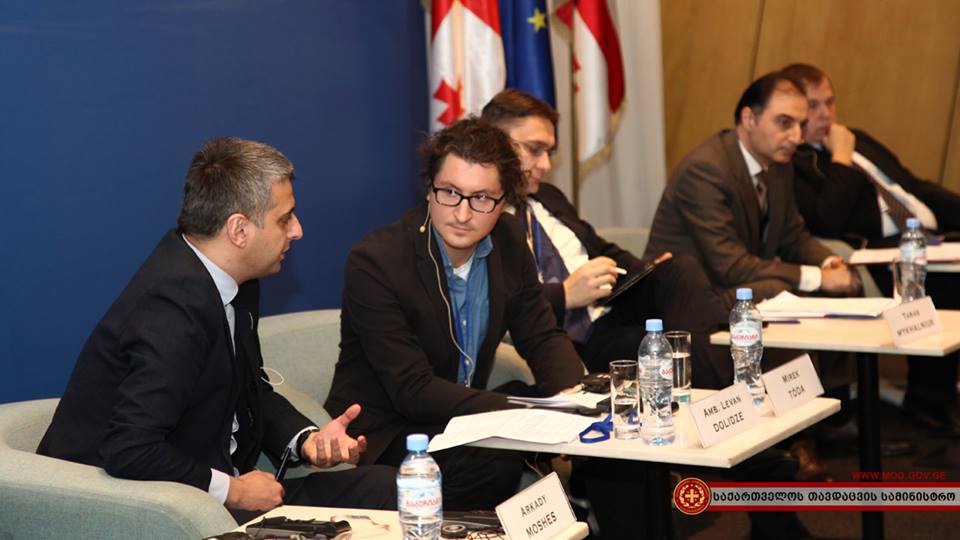| Is Russia winning the information war? |
| The Clarion, Tbilisi / 27 Oct.'15 / 16:48 Joseph Epstein |

Today marks the end of the Tbilisi-hosted South Caucasus Security Forum, convened by the Georgian Ministry of Defense, Centre for European and North Atlantic Affairs (CENAA) and the Georgian Foundation for Strategic and International Studies (GFSIS). The talks brought together policymakers, think-tankers and security professionals from around the world to discuss the most challenging issues in the region.
The Clarion`s Joseph Epstein listened in on two panels that dealt with related topics of information warfare and hybrid warfare. The panelists were of the unanimous opinion that the West needs to be doing more to combat Russia’s information operations and provocations. The most common suggestions included improving awareness, heightening cyber security and increasing intelligence.
A New Cold War?
Arkady Moshes, who covers the region at the Finnish Institute of International Affairs, said the West is doing too little, too late for countering Russian propaganda.
“If you want to be effective in information warfare you have to have a clear message. Russia does, the West doesn’t,” Moshes said. He argued that Western politicians and governments do not take Russia seriously enough, “what Russia is doing is serious. Western politicians are very dismissive… that is the message that should go to the White House.”
Georgia’s former Ambassador to the UK and now Senior Fellow at GFSIS, Giorgi Badridze agreed, calling the existence of a larger confrontation between Russia and the West “undeniable”, and citing Ukraine and Syria as examples of proxy wars between the two superpowers.
“We need to start acknowledging that information warfare is part of a ‘New Cold War’… The West needs to wake up to the reality that Russia is living in a Cold War state,” said Badridze.
Director of Open Ukraine, Taras Mykhalniuk spoke of the success of Russia’s information warfare. “Russian propaganda has succeeded in many ways,” he said, referring to the large audience, both domestic and abroad, reached by Russian propaganda.
Dr. Ariel Cohen, Senior Fellow for the Atlantic Council, struck a slightly different chord. “The demoralization of an opponent has always been used before military operations,” he argued. He then stressed that the information war is at the top of Russia’s political agenda, despite a failing economy and diminishing oil revenues.
“My back-of-the-napkin estimation is that Russia will run out of oil reserves by the spring of 2017,” Dr. Cohen said, touching on the irony of his estimation lining up with the 100th anniversary of the Bolshevik’s rise to power.
Unpacking Russia’s Message
Liudas Zdanavičius of the Military Academy of Lithuania focused on the narrative that Russian propaganda projects towards its neighbors.
“The main topics of propaganda are: Russia is a better world policeman, a guardian of traditional values, NATO will not and can’t defend you,” he said.
Georgia`s former Ambassador to NATO Levan Dolidze, who now leads the Centre for Security and Development of Georgia (CSDG), said both the EU and NATO should provide clear steps for Georgia to gain membership to undermine Russian propaganda which plays on the ambiguity of Georgia’s Euro-Atlantic aspirations.
Dolidze also said that the Russian message “has no boundaries” and “challenges the idea of a free and peaceful Europe.”
Speaking to the “hybrid warfare” panel, former Deputy Chief of Staff for Strategic Plans and Policy, at the NATO Allied Command Transformation, Brigadier General (Ret.) Matt Brand argued that disenfranchised minorities and the West’s disinclination to counter the Russian threat were common themes of Russian propaganda.
General Brand called the Russian takeover of Crimea “not very sophisticated, but effective.” In addressing the modus operandi of the government-sponsored Russian news outlets, he said “the Russians lie, they don’t lie all the time. They lie about half the time.” He went on to say that this is what has allowed the Russian news networks to retain “partial credibility.”
Propaganda vs. Democratic Values
During the question-and-answer sessions after the panels, the concern of impeding free speech to combat propaganda and information operations was brought up twice. In the session on Hybrid Warfare, General Brand assured attendees, “we don’t have to sacrifice democratic values to defeat a hybrid attack.” Ambassador Badridze similarly said, “We live in free countries with free media… We shouldn’t just shut TV stations down; politicians however, should not talk to RT [Russia Today] like it’s a normal station.”
While the statements may have comforted the room, one question remained unanswered. How can governments walk the line between combating propaganda and repressing free speech?
